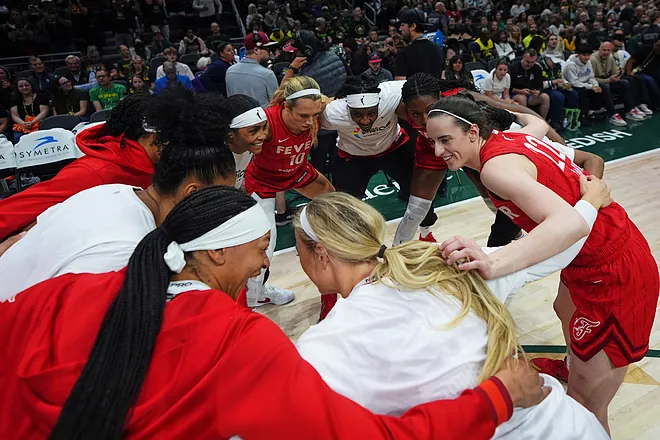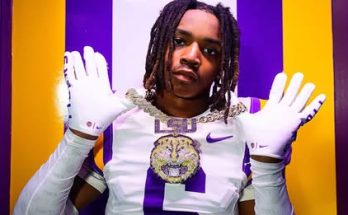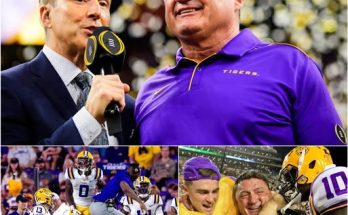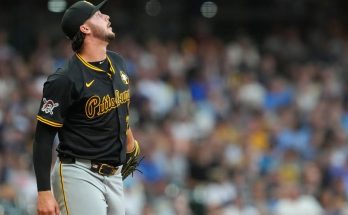Caitlin Clark entered the WNBA with a whirlwind of hype, records, and expectations that would be hard for any athlete to bear. Heralded as one of the greatest college basketball players in history, her transition into the professional league was anticipated as the beginning of a new era—not only for the Indiana Fever but for women’s basketball as a whole. But as the season progressed, cracks began to show. Clark’s performances, though sprinkled with brilliance, have been inconsistent, and the Fever’s struggles have amplified the scrutiny. Now, Lexie Hull, one of her teammates and a fellow competitor in this high-pressure environment, has stepped forward with candid insights that are sparking conversations across the basketball world.
In a recent interview, Hull didn’t hold back when asked why Caitlin Clark has had a harder time than many expected adapting to the WNBA. “It’s not just about her skill set,” Hull explained. “Everyone knows Caitlin is an incredible shooter, playmaker, and competitor. But the WNBA is a different beast. It’s physical, it’s fast, and it’s filled with players who’ve been dominating professionally for years. It takes time to adjust.”
Hull emphasized the unrelenting physicality of the league as one of the biggest hurdles for Clark. “You go from being the most dominant player in college, with the ball in your hands all the time, to facing defenders who are stronger, faster, and more experienced than anyone you’ve seen before,” she said. “Caitlin’s learning that every night is a battle—there are no off nights here.”
Beyond the physical challenge, Hull also highlighted the mental toll of fame and expectations. “Everyone’s watching her. Every game she plays is on TV, every mistake is analyzed, every highlight goes viral,” Hull said. “That level of pressure can weigh heavy on anyone, let alone a rookie trying to find her place.”
Hull’s comments offer a crucial perspective. As someone who has been in the locker room, on the court, and in the film room with Clark, she understands the complexity of the situation. “It’s easy to expect her to just come in and carry the team. But basketball doesn’t work like that, not at this level,” she added. “She’s still learning our system, still building chemistry with the team, still figuring out how to pick her spots.”
Indeed, Clark’s transition has been more turbulent than fans might have hoped. Her shooting percentages have fluctuated, her turnovers have been high at times, and opposing teams have relentlessly targeted her on defense. While she still displays flashes of her signature deep shooting and elite court vision, they often come amid team struggles that dampen her individual efforts.
Hull pointed out that part of the problem lies in the Fever’s growing pains as a team. “We’re young. We’re building. It’s not just Caitlin trying to adjust—it’s all of us trying to figure things out together,” she said. “There’s a learning curve, and unfortunately, it’s playing out in front of millions of people who want results right now.”
Some critics have accused Clark of being overhyped, while others believe the team isn’t doing enough to support her. Hull addressed both sides of the debate. “She’s not overhyped. She’s one of the best basketball minds I’ve ever played with. But expecting her to change everything overnight isn’t fair to her or the team. And we, as her teammates, need to do a better job of helping her succeed,” she admitted.
Hull’s honesty underscores a larger truth about the WNBA rookie experience. Many great players have struggled early in their careers before finding their rhythm. The league’s pace and complexity are often underestimated by casual fans. For Clark, the adjustment has been made even more difficult by the weight of being the face of the league before she even played a professional game.
Yet, despite the challenges, Hull remains optimistic. “Caitlin’s a competitor. She’s tough. She’s smart. She watches more film than anyone I know. She asks questions, she learns, she’s accountable. These tough stretches won’t define her—they’ll shape her,” she said.
Hull also revealed that Clark has been relentless in her effort to improve, staying late after practices, meeting with coaches, and even initiating team workouts. “She’s not blaming anyone. She’s just working. That’s who she is,” Hull emphasized.
Interestingly, Hull also touched on the issue of team dynamics. While there’s been speculation about tension between Clark and some veterans, Hull dismissed those claims. “There’s no beef. That’s just media noise. We’re a team. We have disagreements like any team does, but the locker room supports her. We want to win, and we know we’ll win more when Caitlin’s at her best,” she said.
One of the more eye-opening parts of Hull’s remarks came when she addressed the league itself. “The WNBA is growing, but it still has work to do in how it supports its young stars. The spotlight on Caitlin has been huge, but the support systems need to match that level,” she argued. “Rookies shouldn’t have to carry the load of being ambassadors while also trying to learn how to survive on the court.”
Hull’s comments have reignited debates among fans and analysts about how the league manages its stars, the media frenzy around new players, and the unrealistic expectations placed on rookies. Clark, for her part, has remained largely quiet on the criticism, choosing to let her play do the talking—even as she navigates adversity.
While some fans have grown impatient, Hull encouraged a broader perspective. “Caitlin’s journey isn’t just about this season. It’s about the career she’s going to have. And when she figures it all out—which she will—everyone will remember these struggles as the foundation for her greatness,” she said confidently.
What makes Hull’s insight so compelling is the nuance she brings. She’s not offering excuses, nor is she throwing anyone under the bus. She’s telling the truth from the front lines of a rebuilding team with a spotlight that’s never been brighter. Her perspective invites fans to look beyond the box scores and highlight reels and consider the human side of Clark’s story.
In the end, Caitlin Clark’s early struggles might be the best thing that ever happened to her career. They’re forcing her to adapt, to grow, to learn how to lead not just with her talent, but with resilience. And they’re giving her teammates, like Lexie Hull, a platform to show what real support looks like.
As the Fever fight to find consistency and compete in a league that demands excellence every night, one thing is certain—Caitlin Clark’s story is far from over. With teammates like Hull in her corner and a drive that has already rewritten the history books once, Clark still has every tool to become the star fans envisioned. But as Hull wisely reminded everyone, greatness isn’t instant—it’s earned, day by day, game by game. And that journey, with all its ups and downs, might just be what defines Caitlin Clark the most.



